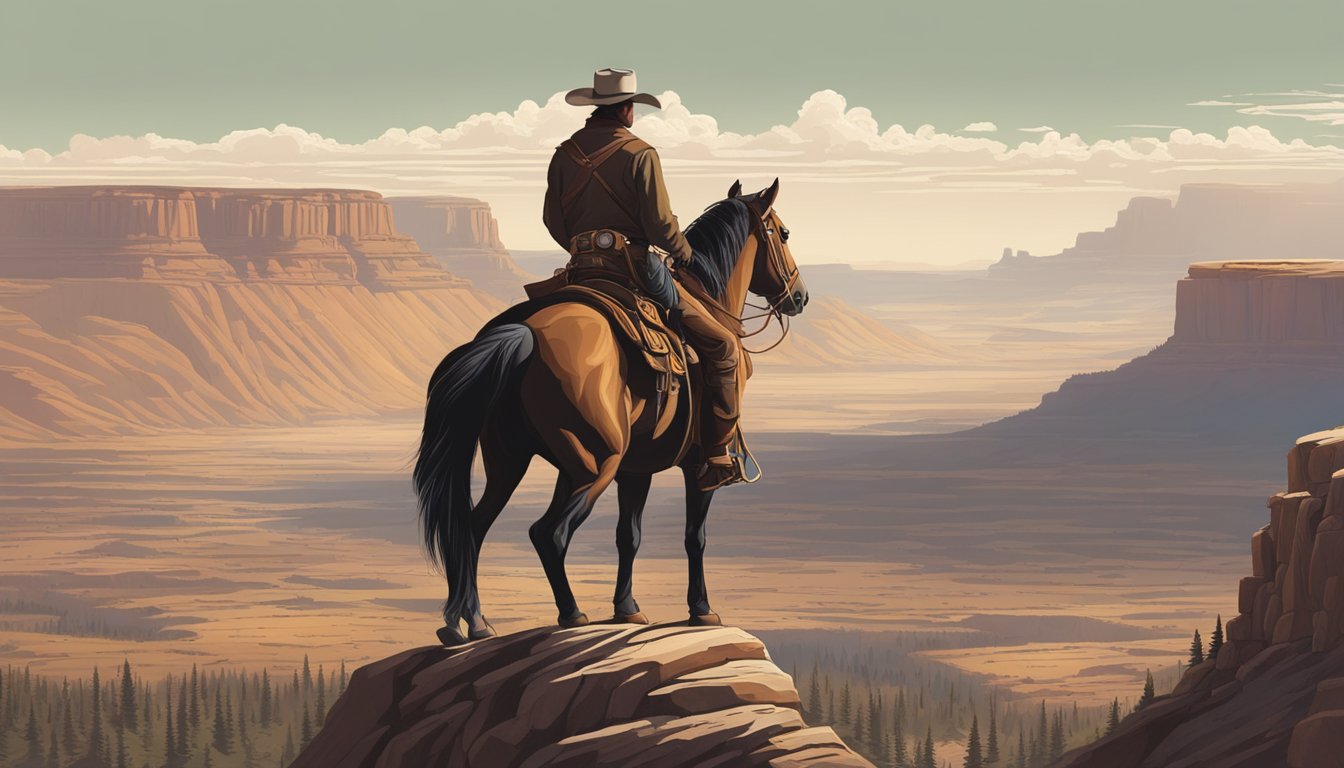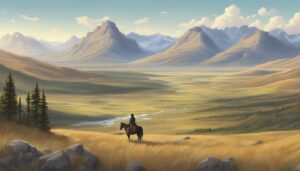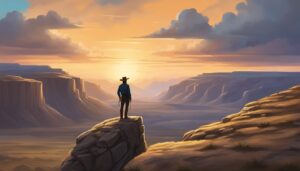Western heroes have captivated audiences for decades, and two iconic figures stand out: John Dutton from the modern TV series “Yellowstone” and Ethan Edwards from the classic film “The Searchers.” Both characters embody the rugged individualism and complex morality associated with the Western genre.
John Dutton, portrayed by Kevin Costner, is a powerful rancher fighting to protect his family’s vast Montana estate in the 21st century. Ethan Edwards, played by John Wayne, is a Civil War veteran on a relentless quest to rescue his niece from Comanche raiders in the 1800s. While both characters display impressive determination and grit, Ethan Edwards ultimately emerges as the more iconic and influential Western hero due to his portrayal in a groundbreaking film that redefined the genre.
The Searchers, directed by John Ford in 1956, is widely regarded as a foundational revisionist Western. Its exploration of darker themes and morally ambiguous characters paved the way for more nuanced portrayals in the genre. Yellowstone, while popular and compelling, builds upon established Western tropes rather than reinventing them.
Exploring the Western Genre
The Western genre has defined iconic heroes and antiheroes for generations, shaping our cultural understanding of the American frontier. Its enduring themes and characters continue to captivate audiences through classic films and modern reinterpretations.
Defining the Western Hero
Western heroes embody the rugged individualism of the American frontier. These characters, often cowboys or lawmen, navigate the untamed Wild West with grit and determination. Classic Western heroes like John Wayne’s characters uphold justice and moral codes.
Modern Westerns have introduced more complex antiheroes. These figures blur the lines between good and evil, reflecting the genre’s evolution. Yellowstone’s John Dutton exemplifies this shift, combining traditional cowboy values with morally ambiguous actions.
The American West serves as more than just a backdrop. It becomes a character itself, shaping the heroes who inhabit it. Harsh landscapes and lawless territories test the mettle of these protagonists, forging their identities.
Themes of honor, revenge, and survival permeate Western narratives. Heroes face difficult choices, often sacrificing personal desires for the greater good. This internal struggle adds depth to their characterizations.
Character Analysis of John Dutton

John Dutton, portrayed by Kevin Costner, stands as a complex and commanding figure at the heart of Yellowstone. His character embodies the clash between traditional values and modern challenges in the American West.
Leadership and the Dutton Family
John Dutton rules the Yellowstone Ranch with an iron fist. His leadership style is authoritative and often unyielding, stemming from a deep-rooted desire to preserve his family’s legacy.
He demands loyalty from his children – Beth, Kayce, and Jamie – and expects them to put the ranch first. This creates a tense family dynamic, with each child struggling to meet John’s expectations.
Rip Wheeler, though not a blood relative, earns John’s trust through unwavering dedication. John’s relationship with Rip highlights his capacity to value loyalty over family ties when necessary.
Power Dynamics and Political Influence
John Dutton wields significant political power in Montana. He leverages his position as a large landowner to influence local and state politics, often blurring ethical lines.
His tactics range from strategic alliances to outright threats. John’s political maneuvering reflects his pragmatic approach to maintaining control over his land and interests.
This power extends beyond politics into local business and community affairs. John’s influence shapes the economic landscape of the region, making him both respected and feared.
His political battles often pit him against corporate interests and government entities, showcasing his determination to preserve his way of life at any cost.
Character Analysis of Ethan Edwards

Ethan Edwards stands as one of the most complex and controversial protagonists in Western cinema. His relentless pursuit of vengeance and deeply flawed nature set him apart from typical heroic figures.
The Complex Nature of an Anti-Hero
Ethan Edwards defies simple categorization. As a former Confederate soldier, he returns home carrying the psychological scars of war. His skills with firearms and tactical knowledge make him formidable. Yet Edwards harbors a deep-seated racism, particularly against the Comanche people.
This prejudice fuels his actions throughout the film. Edwards’ moral ambiguity challenges viewers’ expectations of a Western hero. He often makes ethically questionable choices in his single-minded quest.
Edwards’ character represents a departure from John Wayne’s typical roles. The actor portrays a man consumed by hatred and unable to find peace or belonging in society.
Ethan Edwards’ Quest for Vengeance
The murder of Edwards’ family by Comanches sets him on a path of retribution. His five-year search for his kidnapped niece becomes an obsession. Edwards’ determination is both admirable and disturbing.
He shows no hesitation in desecrating Native American corpses or considering killing his own niece. This reflects his belief that she has been “tainted” by living among the Comanche.
Edwards’ relationship with his part-Cherokee adopted nephew Martin Pawley further illustrates his complex nature. Despite his racism, Edwards reluctantly accepts Martin’s help in the search.
The character’s brutal efficiency and unwavering focus make him an effective tracker. However, these same traits alienate him from others and highlight his inner turmoil.
Contributions to the Western Canon
John Dutton and Ethan Edwards have both left indelible marks on the Western genre, influencing filmmakers and audiences for generations. Their characters represent different eras and approaches to the classic American frontier tale.
Yellowstone’s Modern Western Interpretation
Taylor Sheridan’s Yellowstone brings the Western into the 21st century through John Dutton’s character. The series tackles contemporary issues like land disputes, politics, and family dynamics against a Montana backdrop. Dutton embodies the struggle between tradition and progress, mirroring real-world conflicts in the American West. His character arc explores the costs of maintaining power and legacy in a changing world.
Yellowstone has revitalized interest in Westerns for a new generation. It blends classic Western themes with modern storytelling techniques, creating a fresh take on the genre.
The Searchers’ Influence on Westerns and Beyond
John Ford’s The Searchers, featuring Ethan Edwards, is a cornerstone of classic Westerns. The film’s opening scene, with Edwards framed in a doorway, became an iconic shot replicated in countless movies. Edwards’ complex character challenged the typical heroic cowboy archetype, introducing moral ambiguity to the genre.
The Searchers influenced filmmakers beyond Westerns. George Lucas drew inspiration from its visuals and themes for Star Wars. The film’s exploration of racism and obsession continues to resonate with modern audiences and critics.
Edwards’ relentless pursuit and internal conflicts set a new standard for character depth in Westerns. His legacy can be seen in anti-heroes across various genres.
Legacy and Cultural Impact

John Dutton and Ethan Edwards have left indelible marks on American popular culture. Their characters embody complex themes of power, justice, and identity that continue to resonate with audiences.
John Dutton and the American Ranching Mythos
John Dutton represents the enduring allure of the American West. His character taps into the romanticized ideal of rugged individualism and land ownership. The Duttons’ struggles to maintain their ranch reflect real-world tensions between traditional ways of life and modern development.
John’s fierce protectiveness of his legacy has sparked debates about land rights and conservation. His methods, often involving violence and intimidation, raise ethical questions about power and justice in rural America.
The show’s popularity has reignited interest in ranching culture and Western aesthetics. It has also drawn attention to the challenges faced by modern ranchers, from economic pressures to environmental concerns.
Ethan Edwards and the Portrayal of Indigenous Communities
Ethan Edwards’ character has become a focal point for discussions about the representation of Indigenous peoples in Western media. His complex relationship with Comanche culture reflects the era’s racial attitudes and the violent history of settler-Indigenous conflicts.
Edwards’ obsessive quest highlights the devastating impact of violence on both settlers and Indigenous communities. His character arc has prompted reexaminations of how Westerns depict frontier justice and racial tensions.
The film’s portrayal of Comanche people, while problematic by modern standards, opened dialogues about Indigenous representation in cinema. It has become a touchstone for analyzing how Hollywood’s depiction of Native Americans has evolved over time.
Cinematography and Filmmaking

The visual storytelling in Westerns plays a crucial role in creating atmosphere and enhancing narrative impact. Both “Yellowstone” and “The Searchers” showcase distinct approaches to cinematography that shape their respective worlds.
The Visual Aesthetics of Yellowstone
“Yellowstone” captures the rugged beauty of Montana’s landscapes with stunning wide shots and intimate close-ups. The series employs a modern cinematic style, blending sweeping vistas with gritty realism.
Kevin Costner’s experience from “Dances with Wolves” influences the show’s visual language. Scenes often feature characters framed against expansive horizons, emphasizing their connection to the land.
The cinematography in “Yellowstone” uses natural light and muted color palettes to evoke authenticity. This approach creates a visual texture that complements the show’s themes of tradition and change.
Monument Valley and John Ford’s Vision
John Ford’s use of Monument Valley in “The Searchers” set a benchmark for Western cinematography. The iconic buttes and mesas become characters themselves, shaping the film’s mood and symbolism.
Ford’s composition techniques frame characters against vast landscapes, highlighting their isolation and inner struggles. This visual style profoundly influenced later Westerns, including “Unforgiven.”
The bold colors and dramatic shadows in “The Searchers” create a heightened sense of drama. Ford’s masterful use of depth and scale in his shots emphasizes the epic nature of Ethan Edwards’ journey.
Reflection on the Heroes’ Journeys

John Dutton and Ethan Edwards embark on distinct yet compelling heroic journeys. Their quests involve personal struggles, family ties, and a clash between tradition and change.
John Dutton’s Battle for Legacy
John Dutton faces relentless challenges to preserve his family’s vast ranch in Montana. His journey centers on protecting the Dutton legacy from external threats and internal family conflicts.
Dutton’s battle often pits him against land developers, Native American tribes, and government officials. He employs both legal and questionable tactics to maintain control of his empire.
Family plays a crucial role in Dutton’s journey. He grooms his children to continue the family legacy, sometimes at great personal cost.
Ethan Edwards’ Internal and External Conflicts
Ethan Edwards, a former Confederate soldier, undertakes a grueling five-year search for his abducted niece. His quest blends elements of revenge and redemption.
Edwards’ journey is marked by his complex relationship with Native Americans. His hatred drives him, yet he possesses intimate knowledge of their culture.
The Texas Rangers play a role in Edwards’ story, representing law and order in contrast to his lone wolf approach. Edwards operates outside their authority, driven by personal vendetta.
Edwards battles not only external foes but also his own prejudices and trauma from the Civil War. His journey forces him to confront his inner demons and reassess his worldview.
Influence on Modern Westerns and Culture

John Dutton and Ethan Edwards have left indelible marks on Western cinema and television. Their characters continue to shape portrayals of the American West and influence contemporary storytelling.
How ‘Yellowstone’ Shapes Contemporary Views
‘Yellowstone’ has redefined the modern Western, bringing the genre into the 21st century. The show tackles current issues like land disputes, corporate greed, and Native American rights. John Dutton embodies a complex anti-hero, blurring the lines between right and wrong.
This nuanced approach has sparked renewed interest in Western-themed content. ‘Yellowstone’ has inspired several spin-offs and similar shows, expanding its cultural footprint. The series has also boosted tourism in Montana, where it’s filmed.
Dutton’s character has become a symbol of the struggle to preserve traditional ways of life in a rapidly changing world. His influence extends beyond entertainment, shaping discussions about rural America and land conservation.
The Enduring Legacy of ‘The Searchers’
‘The Searchers’ and Ethan Edwards continue to influence Western films and broader cinema decades after their debut. The film’s exploration of racism and obsession set new standards for character depth in Westerns.
Ethan Edwards inspired countless morally ambiguous protagonists in later Westerns. His complexity paved the way for characters like Clint Eastwood’s “Man with No Name” in ‘Once Upon a Time in the West’.
The film’s visual style, particularly its use of landscape shots, became a template for future Western directors. ‘The Searchers’ also influenced non-Western films, with its themes and techniques appearing in works across various genres.
Edwards’ character continues to provoke discussion among film critics and audiences, cementing the film’s place in cinematic history. His legacy serves as a benchmark for character development in modern Westerns.



